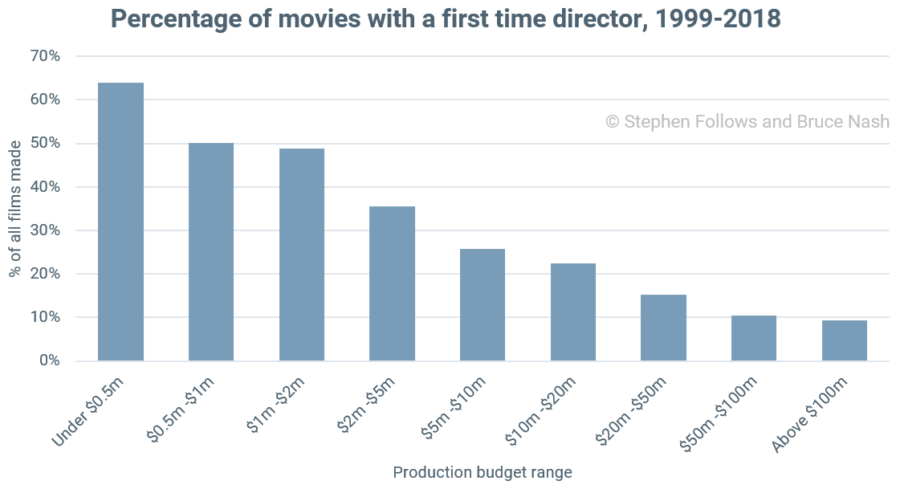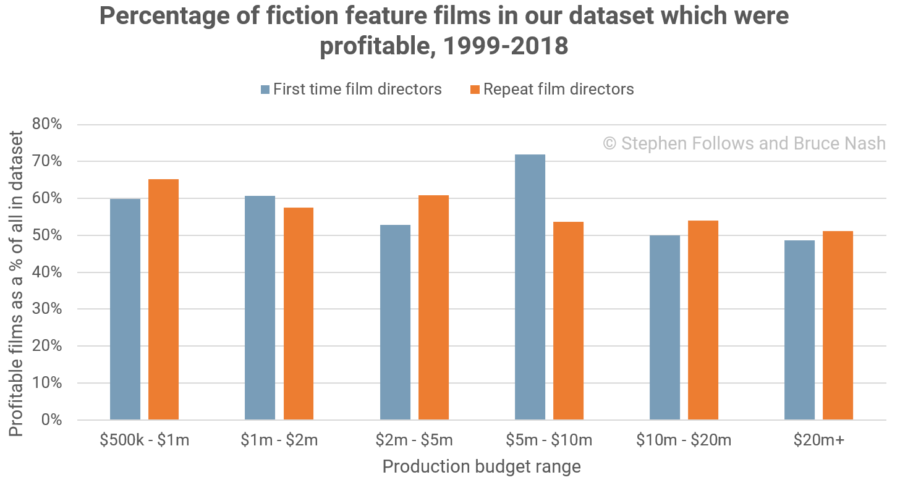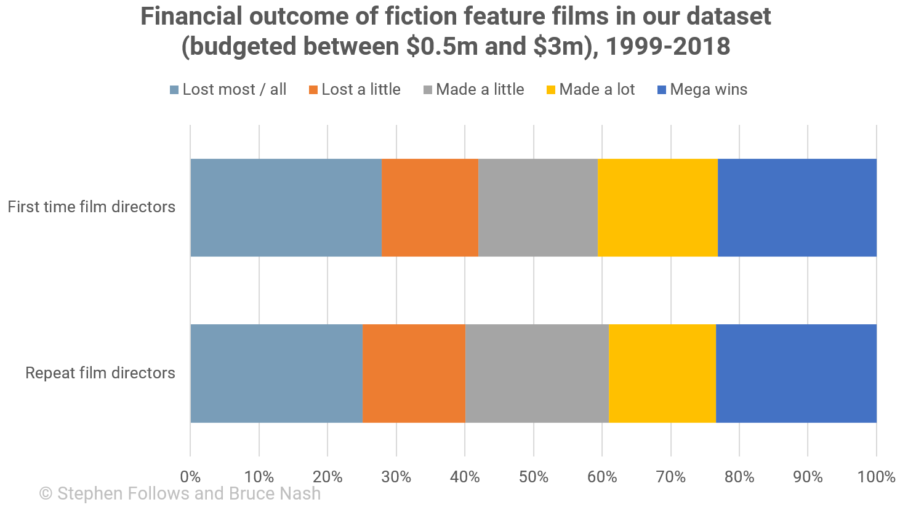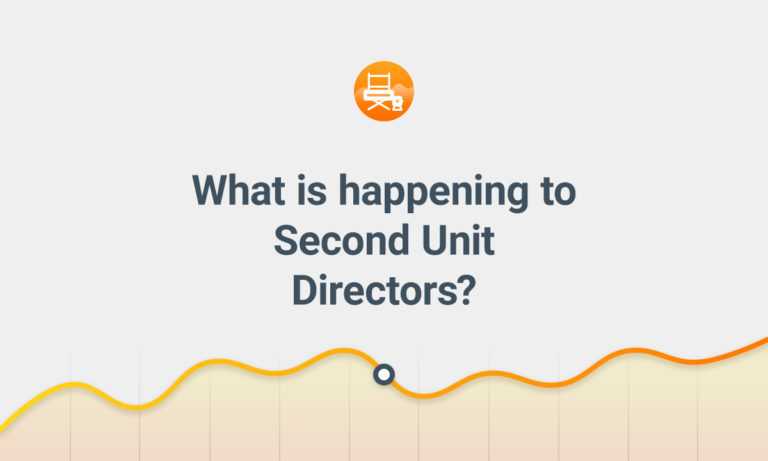 Of all the creative jobs involved in the making of a feature film, the role of director is perhaps the most important.
Of all the creative jobs involved in the making of a feature film, the role of director is perhaps the most important.
It’s also the one which most clearly identifies a film. We talk about Spielberg films and Tarantino films more than we do Streep or Hanks films, even though all of these creatives are at the top of their field.
Some reasons for selecting one director over another are artistic (their skill, their ‘voice’, their connection to the script, etc) while others are pragmatic. When it comes to picking the perfect person to helm a film, producers and financiers want to do all they can to ensure the film will be a financial success.
There is a perception in some quarters that hiring a first-time director is too risky. But is that perception justified? I teamed up with Bruce Nash from The Numbers to take a look at the data to find out.
We focused on 3,217 narrative (i.e. non-documentary) feature films released between 1999 and 2018 which had just one director. For each film, we have detailed estimates of their financial performance, allowing us to make a reasonable assessment of the project’s overall profitability.
This allows us to look at whether hiring a first-time feature film director is a risk and, if so, by what degree.
What percentage of films are directed by a first-timer?
We should start by looking at how common it is for a film to be directed by someone who has not previously directed a movie.
The prevalence of first-time directors declines as budgets rise, with two-thirds of micro-budget productions being a directorial debut, compared to just one in ten films budgeted over $20 million.

The connection between debut directors and profitability
At most budget levels there is a slight advantage in favour of experienced directors, but the difference is extremely minor. The only budget level in which first-time directors appear to have a clear advantage over repeat directors is in the $5m to $10m range. This includes such bold (and profitable) film debuts as Get Out, Billy Elliot, (500) Days of Summer and Layer Cake.

Note: The absolute percentages are not significant; it’s the difference between the two percentages at each budget level which reveal the trend.
The effect of a first-time director is at its weakest on the largest budget range, i.e. movies costing upwards of $20m. While this may at first appear to be an unusual result, it’s worth considering who these “first-time film directors” are at this level. They are very unlikely to be fresh out of film school, but rather will have already proven themselves in other related fields. For example, Joss Whedon had experience in television before directing Serenity, Richard Curtis was a well-established writer before directing Love Actually, and Wally Pfister cinematography experience was what landed him the directing job on Transcendence.
What’s the risk?
To get a deeper understanding as to what is causing this slight difference, we moved beyond a binary profit/loss outcome. Taking into account all costs and income we are able to calculate the likely financial return for each movie and categorise them into the following five outcomes:
- Lost most / all – Returned below 50% of the production budget.
- Lost a little – Returned between 50% and 100% of the budget.
- Made a little – The film recouped its budget and earned additional profit up to its original budget.
- Made a lot – Returned a profit of between one and three times its budget.
- Mega wins – The film’s profit was more than three times its original budget.
Seen through this lens, the data reveals that the slight difference found in the previous chart is down to two factors:
1. Films from repeat directors are marginally less likely to fail completely (28% for first-timers vs 25% for repeat directors); and
2. Films from repeat directors are marginally more likely to be modestly profitable (17% vs 21%).

This finding suggests two things. First, repeat directors learn a little from their mistakes, and are fractionally less likely to make a dud. Second, the slightly higher share of moderately successful films might be related to directors who find a profitable niche in the industry, and can produce films that fit that niche well.
Notably, in this analysis, first time directors are just as likely to make breakout hits as repeat directors.
Conclusion
Hiring a first-time director to work on a film might sound risky, but our analysis suggests that it actually doesn’t have much influence on the likelihood of a feature film being profitable.
While luck plays a part, producers and investors are generally fairly smart in selecting first-time directors, or at least in giving them the right budget to work with.
Overall, one thing is clear. Hiring a first-time director is not the kiss of death for any film.
Notes
 In order to conduct this study, we began with a list of 3,217 films from The Numbers’ financial database, investigating full financial details, including North American (i.e. “domestic”) and international box office, video sales and rentals, TV and ancillary revenue. We narrowed our focus to study feature films released between 1999 and 2018. Finally, we calculated the likely profit margin for the producers, after all revenue and expenses were taken into account.
In order to conduct this study, we began with a list of 3,217 films from The Numbers’ financial database, investigating full financial details, including North American (i.e. “domestic”) and international box office, video sales and rentals, TV and ancillary revenue. We narrowed our focus to study feature films released between 1999 and 2018. Finally, we calculated the likely profit margin for the producers, after all revenue and expenses were taken into account.
The financial figures come from a variety of sources, including people directly connected to the films, verified third-party data and computation models based on partial data and industry norms. It is possible that one or two of the individual figures are different to our predictions, though en masse we are confident of the larger picture.
It’s worth noting that today’s figures should not be used to infer the overall profitability of films more broadly. Our dataset has been created based on available data and while this works for answering our core question, it cannot be read as an objective measure of sector averages.
Epilogue
This is an article I co-wrote with Bruce Nash from The Numbers for the American Film Market. We’re both very grateful to the AFM for their continued support of our research.





Comments
Hi Stephen.
An interesting review…my first effort as a feature director, a no age restricted film was an overwhelming success for the finance providers. Filmed on locations in South Africa and Israel it recouped budget within three weeks of its release…and has continued to bring in profit since its release more than thirty years ago. Thought it worth a mention.
Neil H
Hey Stephen,
Great article! Being a supporter of first-time filmmakers at Goldfinch this is great research to support our mission. The minor difference between a first time and repeat director might also be down to the fact that its the sum of parts that make a film a success, and not always just one individual.
I thought the same thing. Always love the articles Stephen.
Very exciting! Thanks Stephen for this contribution!
Hi Stephen,
Great research indeed! Thank you so much for sharing it! I understand is a complex topic, but would be very intriguing to see – if there was a way to measure it – if other factors (e.g. ethnicity, nationality, age group…) play a role at all when it comes to fail/success ratio (for first-time directors). Thanks again Stephen, to you and Bruce for the great article!
I was wondering about the factor of genre, mainly if it is a documentary or fiction.
The study was for feature films only.
———————————
We focused on 3,217 narrative (i.e. non-documentary) feature films released between 1999 and 2018 which had just one directo
Thanks for your hard work in accumulating and presenting this data. Small proviso. If the data was available, I think it would have been interesting to see further analysis based on the issue of director versus writer-director in both the first time and repeat categories.
It would be important to know what your definition of a “first time director” is: (a) never ever really made any film before? (b) a film school graduate with anumber of short films under his/her belt? (c) a person with significant work experience as 1st AD (d) a person with experience from other jobs in the film biz? (e) a writer turned dirctor ? – There are certainly “selection issues” when ‘hiring’ a so- called first time director… and such issues would definitely have a significant impact on your study, or not ?
Be.
Hi Be
Yes, that’s right. This is looking at “first-time directors” as the industry typically applies the term, i.e. not directed a feature film before. It’s an arbitrary divide that seems to be over-used, undervaluing all the other types of experience. Especially with the size and scale of TV and streaming projects nowadays.
S
Dear Stephen
Fascinating article. Thank you. I was involved in the first Zimbabwean feature film ‘Jit’ and the reason it lost money was in the distribution, not directing.
How does marketing play into this, example Netflix, while being a closed loop in distribution, claims huge wins with films like ROMA, while spending $60m just on the Oscar campaign, rumors abound say the final marketing budget was over $150M. Other rumors state The Irishman had a similar marketing budget and an estimated film budget in excess of $225M yet garnered considerably less awards and repeat viewing is TBD. Promising Young Woman had an estimated budget of $5-10M? and made an est. $18M in the box office, but was nominated for multiple awards, the question about the marketing was not immediately available. I would be curious to see a study on marketing budget vs return maybe relative comparative percentage of original budget and the success of said film. Now we know the more a film is advertised the more chance of it being seen, however it doesn’t necessarily mean repeat long term success, so maybe that would include longevity, repeat views?
I bet the differences aren’t statistically significant either.